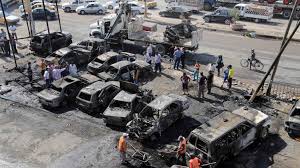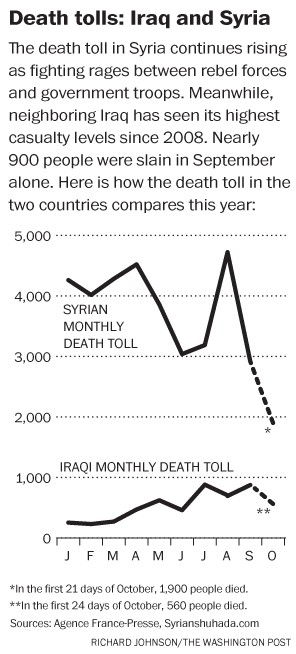 Nearly two years after the U.S. troop withdrawal, Iraq is in the midst of a deepening security crisis as an al-Qaeda affiliate wages a relentless campaign of attacks, sending the death toll soaring to its highest level since 2008.
Nearly two years after the U.S. troop withdrawal, Iraq is in the midst of a deepening security crisis as an al-Qaeda affiliate wages a relentless campaign of attacks, sending the death toll soaring to its highest level since 2008.
In the latest violence, nine car bombs tore through markets and police checkpoints in Baghdad on Sunday, killing dozens of people.
The bloody campaign has virtually erased the security gains made in the past five years. More than 5,300 Iraqis have been killed this year.
Sunday’s attacks occurred just three days before Iraqi Prime Minister Nouri al-Maliki is scheduled to arrive in Washington, where he will take part in meetings at the White House and on Capitol Hill. At the top of his agenda is a request for more U.S. help in the fight against the al-Qaeda affiliate, whose scope has grown to encompass neighboring Syria as well.
“We need to increase the depth and width of our cooperation, to be more agile and reflect the seriousness of the situation in Iraq,” Iraq’s ambassador to Washington, Lukman Faily, said in a telephone interview. “In our discussions, we will highlight the urgent need for the approval and quick delivery of military sales.”
At least 40 people died Sunday in attacks on mostly Shiite neighborhoods in Baghdad, according to an Interior Ministry official, who was not authorized to be quoted by name. In addition, a suicide bomber plowed his car into a group of soldiers in the northern city of Mosul, killing 14, according to a local police official.
More than 600 people have been killed in Iraq this month, after extraordinary bloodshed left 880 dead in September.
 The surge in violence is largely, though not exclusively, due to attacks by the Islamic State of Iraq and Syria, or ISIS, an outgrowth of al-Qaeda in Iraq. The group is trying to undermine the Iraqi state through a relentless campaign of car bombings, assaults on security forces and assassinations. ISIS has also carried out several jailbreaks, freeing militants whom American and Iraqi forces worked for years to capture.
The surge in violence is largely, though not exclusively, due to attacks by the Islamic State of Iraq and Syria, or ISIS, an outgrowth of al-Qaeda in Iraq. The group is trying to undermine the Iraqi state through a relentless campaign of car bombings, assaults on security forces and assassinations. ISIS has also carried out several jailbreaks, freeing militants whom American and Iraqi forces worked for years to capture.
Shattering of calm
Iraq once looked as though it could be stabilizing. After a horrific sectarian war engulfed the country in 2006 and 2007, the United States sent a surge of troops and began enlisting Sunni fighters to turn against al-Qaeda. When the U.S. military withdrew at the end of 2011, militant groups were on their heels and monthly civilian death tolls were in the dozens rather than the hundreds.
That period of relative safety lasted into 2012, but it began to unravel as Syria’s anti-government protest movement developed into a civil war fought along sectarian lines.
Many radical Sunni fighters in Iraq and Syria have now united under the banner of ISIS. The militants consider the two nations to be different fronts in a single war with an ambitious goal.
“They want a caliphate,” said Jessica Lewis, research director at the Institute for the Study of War, who has investigated the resurgence of al-Qaeda in Iraq. She was referring to the Islamic political system that ruled most Muslims after the death of the prophet Muhammad.
One of the group’s most important victories came in September 2012, when militantsfreed about 100 inmates from a prison in Tikrit. The infusion of manpower helped the organization intensify operations this past spring, Lewis said.
ISIS launched an even more devastating attack on the notorious Abu Ghraib prison on July 21, freeing more than 500 convicts who could bolster the group’s capabilities further in the coming months.
“My best estimate based on [the Tikrit] example is that we’re going to see another huge growth step in operational capability in the new year,” Lewis said.
Sectarian mistrust
The rise of ISIS has coincided with political dysfunction in Baghdad. During Iraq’s recent years of relative calm, Maliki has consolidated power in a way that has left many Sunnis feeling disenfranchised under the Shiite-led government. Sunni leaders complain bitterly that he has used his control of Iraq’s security forces to sideline political opponents under the pretense of combating terrorism.
In the vast deserts of Anbar province in western Iraq, the government has deployed thousands of troops to patrol its nearly 400-mile-long boundary with Syria.
But the border has become largely theoretical, and militants have moved across it with ease. In the atmosphere of sectarian mistrust that pervades Iraq, the Shiite-majority federal forces have not coordinated well with the province’s mainly Sunni tribes and local police, according to Anbar’s governor, Ahmed Khalaf al-Dulaimi.
Anbar has suffered at least seven major attacks in the past week, including assassinations of local political leaders, the siege of a government electricity office and assaults on checkpoints.
The largest operation was an Oct. 20 attempt to storm a police compound in the city of Fallujah that includes a prison. The assault by 25 men armed with guns and mortars was ultimately repulsed, according to a police official involved in the response, but the battle lasted five hours and left four police officers dead.
On the other side of the sectarian divide, Iraq’s various Shiite militias, some of which receive funding and strategic direction from Iran, appear to be stepping up operations. Public funerals throughout southern Iraq memorialize militia members who have died fighting for the regime in Syria, and there are growing signs that some militias are bringing the fight back to Iraq.
In the southern Shiite-majority provinces of Basra and Dhi Qar, at least 12 members of the Sunni Sadoon tribe have been killed in recent weeks, according to a senior Basra police official, speaking on the condition of anonymity. Dozens more members of the tribe in Dhi Qar have reported receiving death threats, and at least eight families have fled their homes, according to Haider Salman, a municipal council leader.
In Basra, the threats against Sunnis are so serious that Sheik Abdul Kareem al-Khazraji, who heads the government authority that administers Sunni religious sites, ordered mosques to close their doors because of the risk of attacks on large gatherings of worshipers.
“We are directing people to pray at home, to protect their lives,” Khazraji said.
To the north, militias have been active in Shiite-dominated pockets of Diyala province. Six Sunnis were killed in Muqdadiyah, according to a tribal leader in the area who identified himself as Sheik Abu Muhammad.
Such incidents are haunting for Iraqis who recall the violence of the last decade. The killing rose exponentially in 2006 when attacks on Shiite religious sites prompted militias to retaliate with campaigns of sectarian killing and intimidation.
The bloodshed this year has not reached those terrible peaks. But al-Qaeda’s leaders in Iraq again seem determined to use horrific violence to provoke retaliation by the government and Shiite militias. Sunday’s attacks targeted predominantly Shiite areas in Baghdad. In recent weeks, car bombs in Baghdad have targeted not only day laborers and markets, but also funerals and even a playground full of children.
As the death toll mounts, Iraq is approaching national elections in April. In past years, militants have typically stepped up attacks before elections in an attempt to intimidate voters and create an atmosphere of fear. The result has been beneficial for campaigns defined by sectarian and ethnic politics.
“Imagine Iraq as a ship in the middle of a storm,” Maliki said in a televised interview in early October, “and some of the cabin crew ask the captain to control the movement of the ship. How can he do this with all of the high waves?”
Washington Post
Top photo: Nine car bombs tore through markets and police checkpoints in Baghdad on Sunday, killing at least 62 people.

Leave a Reply
You must be logged in to post a comment.